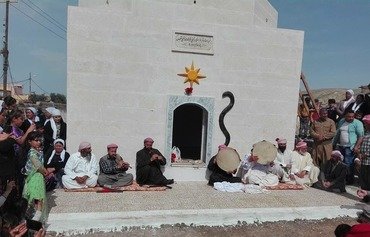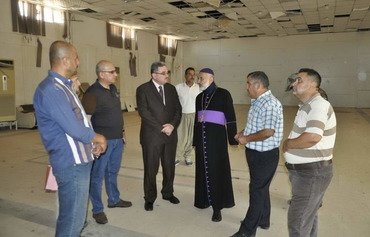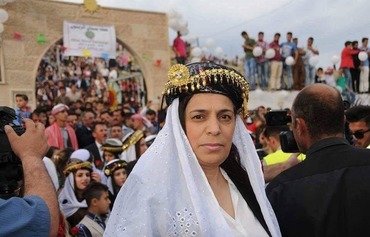A dozen kilometres north-east of Mosul, the Ninawa province town of Bashiqa is witnessing heavy activity as its local council races to rebuild all that was destroyed by the "Islamic State of Iraq and the Levant" (ISIL) after two years of the group's rule.
On November 8th, Iraqi peshmerga forces expelled ISIL elements from Bashiqa , but the level of damage they left behind amounts to about 30% of destroyed homes, government buildings and infrastructure, said local council member Hussain al-Shabaki.
ISIL turned the town into a "disaster area", he told Diyaruna.
"There is no drinking water or electricity," he said. "Most of the public services have been either partially or completely destroyed by the terrorists."
"Many homes, private property and places of worship did not escape this deliberate destruction either," he added.
The local council is diligently working to rehabilitate the town, al-Shabaki said. "We are disposing of thousands of tonnes of cement resulting from the bombing of the council building and the nearby veterinary directorate."
Additionally, the main streets are being cleared of piles of rubble, burned cars and war debris, he said.
However, land mines and explosive ordnance are impeding Iraqi forces' advancement, he said, noting that "bomb experts are dismantling improvised explosive devices (IEDs), but there are thousands of them scattered across a vast geographical area, which makes removing them a harder and longer process."
In addition to rigging many buildings in Bashiqa, he said, ISIL has also placed explosives in and around artesian water wells.
Al-Shabaki urged government and local and international organisations to provide the necessary aid to help rebuild the town.
He also called for financial compensation for those whose houses have been destroyed so they can rebuild their lives.
Crimes against minorities
Yazidis make up more than 70% of Bashiqa's residents, with a minority of Christians and other sects, according to Kawa Ido al-Khitari, a Yazidi human rights activist and head of the Jafeen organisation for development.
Bashiqa has yet to witness the return of its residents, most of whom -- about 100,000 families -- fled to the Kurdish region, he told Diyaruna.
"The town is still not completely clear of explosive devices and services are still unavailable but there are intensive local efforts to remove all the signs of destruction left behind by the terrorists," he said.
At least 350 houses have been destroyed, he said, in addition to shrines, temples and churches.
Al-Khitari said his organisation has sought to document all the crimes committed by ISIL in Bashiqa and other areas in the Ninawa Plain area where a mix of different Iraqi ethnicities and sects live side by side.
"We have to rebuild the cultural and religious heritage of the people there in a joint national and international effort, but we first need to start with the most urgent public services projects," he said.
Al-Khitari urged the government to put together and implement programmes that lay the foundations for peace and security in the areas liberated from terrorism.
The people of Bashiqa, like others from towns and villages that were occupied by ISIL, have witnessed "catastrophic incidents unprecedented in modern history", said Sinjar mayor Mahma Khalil.
"Terrorists drove out all the residents from Bashiqa, killed everyone they captured, and plundered and destroyed places of worship and private and state property," he told Diyaruna.
Khalil called on all residents to spare no effort in taking part in the reconstruction efforts.
"After achieving victory [against ISIL], we now have to work together to bring the city and its services back to what they used to be so people can go about their daily lives feeling safe and unafraid," he said.

![The 'Islamic State of Iraq and the Levant' left behind a wave of destruction in Bashiqa that affected homes, infrastructure and places of worship. [Photo courtesy of the Ninawa provincial council]](/cnmi_di/images/2016/12/05/6711-Iraq-Mosul-Bashiqa-600_384.jpg)






